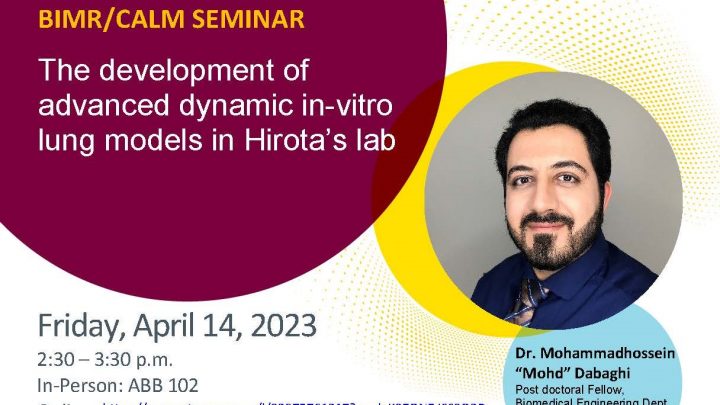The development of advanced dynamic in-vitro lung models in Hirota’s lab
Apr 14, 2023
2:30PM to 3:30PM

Date/Time
Date(s) - 14/04/2023
2:30 pm - 3:30 pm
Categories
Dr. Mohammadhossein “Mohd” Dabaghi
Post doctoral Fellow, Biomedical Engineering Dept., McMaster University
Abstract
The lung is a complex and dynamic organ, making it challenging to model comprehensively in vitro. Any lung model should resemble the native structure, composition, dynamic environment, mechanical properties, and essential physiological characteristics. To study lung processes in health and disease, diverse pre-clinical lung models have been designed that present various degrees of complexity and similarity to the in situ state. However, majorities of these models lack the dynamic and 3D environment of human lungs. In Hirota’s lab, our vision is to develop complex dynamic in vitro lung models that can be leveraged for various purposes, from studying the different aspects of lung biology to testing different drugs for pulmonary diseases. We focus on using these models for basic science in lung health and disease while also being the foundation for transplantation strategies with bioengineered tissues.
Bio
Dr. Dabaghi completed his Ph.D. at McMaster University, majoring in Biomedical Engineering, where he worked on novel microfabrication technologies to develop an Artificial Placenta device for preterm neonates with respiratory failure. He earned his M.S. in Biomedical/Chemical Engineering (2014) and his B.S. in Chemical Engineering from the Sharif University of Technology, Iran (2012). His works have been highlighted in various journals and news as a new and promising approach to improving the life quality of preterm neonates suffering from respiratory distress syndrome. He is best known for his contributions to developing novel microfluidic devices and technologies. In 2019, he joined Dr. Jeremy Hirota’s lab at the Department of Medicine at McMaster as a postdoctoral fellow. His current research interests focus on developing new biomedical devices for disease modeling or drug screening, biosensors for organ-on-a-chip devices, and bioinks for bioprinting. In addition, he develops various natural-based biomaterials to create advanced in vitro lung models for studying pulmonary fibrosis. These tools will enable doctors to test and optimize the different combinations of drugs for patients with pulmonary fibrosis to produce results faster than the current diagnostics tools.
In-Person: ABB 102
Online: https://mcmaster.zoom.us/j/92875761217?pwd=K0ZQNDJSS0Q2RWpEY3RrNjVjNU9LQT09

